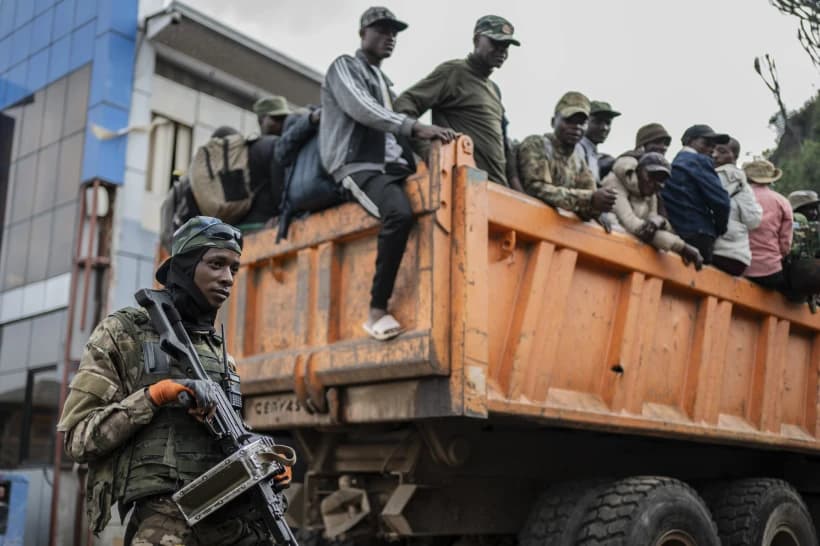YAOUNDÉ, Cameroon – Grim statistics from a new SOPROAD, a French-language development agency, report show that nearly 600 children have been forcibly recruited by armed groups in Lubero Territory, North Kivu, eastern Democratic Republic of Congo (DRC).
SOPROAD coordinator Jean-Pierre Kakule Kavaketi confirmed 584 children are currently being used as fighters by these groups in the area. What worries him further is the emergence of over 100 children who have formed their own militias.
The conflict is also disrupting education, with Save the Children reporting that roughly 375,000 children in North Kivu are unable to attend school, a situation that makes them susceptible to recruitment by armed groups.
Kakule Kavaketi emphasizes that armed groups have failed to keep their commitments to stop recruiting child soldiers.
“What is blocking the exit of these children from armed forces and groups is in particular the weak commitment of the leaders of these groups, but also the lack of concrete actions on the part of child protection agencies and members of the protection subgroup,” he said.
Marie-Laure Joliveau, Africa Program Manager at BICE (International Catholic Child Bureau) said her organization’s partners in Goma have also recorded 291 cases of children forced into armed groups in Goma, Turunga, and Ngarabongo.
“Among the 291 were 83 children between the ages of 13-17 years, 115 between 18-30 years and the others between 31-35 years,” she told Crux.
She also cited local partners of BICE as revealing that 201 children displaced from Goma were in the brink of being recruited by armed groups before they were rescued.
“They found themselves alone there, and we returned them to extended foster families for their protection,” she said.
“Of the 241 children initially identified, we were only able to care for 201. For 40 of them, we were unable to locate their families. Of the other 15, the entire family had been wiped out, killed by the armed groups,” Joliveau said.
“This raises an important question: why do armed groups continue to recruit children into their ranks, even though they have already promised to stop this practice?” Joliveau wondered.
“This situation unfortunately contributes to creating fear among families, “she noted.
She said recruiting children to armed groups has a terribly traumatizing effect.“It truly disrupts their lives, traumatizes entire families, and also compromises peace and social cohesion. Relationships between these young people and the rest of the community are also shattered. They are then often stigmatized, and rejected, even by members of their own families,” Joliveau said.
Armed groups have plagued North Kivu for decades, a relic of regional wars that played out in the region during the 1990s and early 2000s. Militias during this period were notorious for recruiting child soldiers known in Swahili as ‘kadogos’ or ‘little ones.’
The practice surged in recent years with the advent of the Rwanda-backed M23. The Tutsi-backed militia has conquered vast swathes of territory in the region, conquering Goma in the process.
A report by the United Nations indicates that all armed groups have been recruiting children “on an unfrequented scale.”
The UN children’s agency UNICEF estimates that 30 percent of the members of Congolese armed groups are children. The agency says they helped 2,021 children reintegrate after leaving militias between January and June last year.
Victims’ testimonies
On June 26, 2024, the UN Security Council heard a personal and harrowing testimony from a former child soldier who recounted how he was abducted and forced to join an armed militia in the DRC. The 16-year-old recalled that he was born into armed conflict.
“I was forced to join an armed group while I was walking to school,” he said.
He recalled an attack in two neighboring villages where “children were targeted for abduction and forced to join armed groups, while others were abducted to hold their families to ransom.”
“This led to the murder of many children whose families do not have the means to pay the ransom demanded,” the child recalled.
“We cried and trembled, begging them to let us go home to our families, but they wouldn’t listen. That’s when they started whipping us and keeping us in the bush. We were heavily guarded, and they had ordered to kill anyone who tried to flee.”
A 2017 report by War Child UK and War Child Holland indicates that of 300,000 child soldiers active in armed conflict, 40 percent were in the DRC.
Régine Mbuyi, Executive Secretary of the Bureau National Catholique de l’Enfance, the national affiliate of the International Bureau for Children’s Rights, told Crux that the numbers are definitely higher given that armed groups typically hide information related to the recruitment of children.
Through the National Bureau for Children’s Rights, Mbuyi has overseen projects dedicated to the social reintegration of children, particularly former child soldiers.
Key initiatives include facilitating the reintegration of children released from armed forces and groups, supporting socio-economic recovery for released children and conflict victims (with the International Labor Office), aiding the economic reintegration of self-demobilized children (with UNICEF), preventing child recruitment, and offering psychosocial support
According to Mbuyi, these projects are designed to ease the shift from military to civilian life by promoting socio-educational activities, fostering responsible citizenship over reliance on weapons, and ensuring these children can lead active lives within society.












